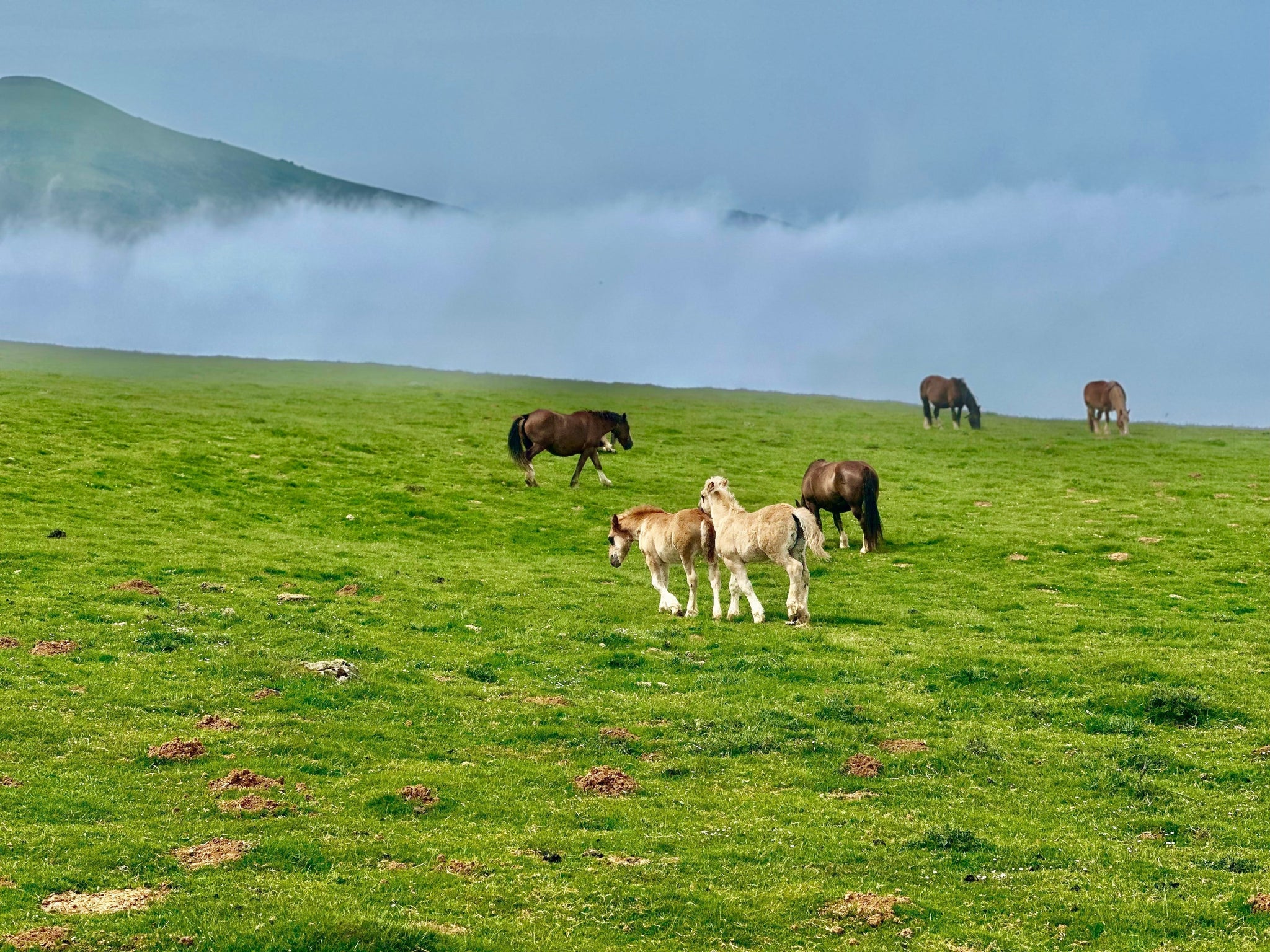
A miniature moose has gone missing. His coat is sandy brown with short hair and he boasts wide, stiff antlers and good posture. He is different from his (apparently) younger brother who is more-flimsy with soft, chestnut fur and cuddly antlers. Jonah notices that I managed to lose the elder of the two native-to-Maine creatures. He grins, implying some meaning in what Adrian has cast as the older of the pair unknowingly tumbling from the passenger side of my car at some unidentified point into who knows where while in my care.
I suspect behind his indignation and with the aid of budding maturity, Jonah is using humor to ease Adrian’s suffering over my poor performance as a nanny (and mother). To be fair, I had remembered to gather the furry brothers in the early morning, placing them at the top of my overflowing bag so that they would be with me all throughout the day and therefore at school pick-up in the late afternoon, as requested.
Adrian picked them out in a tiny, local hotel gift shop a few weeks back. If you find something you like in this quaint and untended room with the lace curtains on the faux windows you take it to the front desk to make your purchase. We’d just eaten a buffet lunch and allowed for an indulgence in a mammoth slice of lemon cheesecake. I took a spoonful of whipped cream off the top of Jonah’s piece and shook it into my coffee. I could taste a hint of lemon mixed in with the cream and the bitter beverage brought over by a waitress with bright eyes. She wore a French braid that arched around her head like a pretty crown and her face lit up when she recognized us as familiar patrons.
We have no fewer than one hundred thousand stuffed animals in our home. Well, maybe not quite that many. I might have rejected the recent purchase if Adrian hadn’t offered to pay with his own money and also if the deluge of fur babies we own were solely appreciated as decorative or played with only briefly and then forgotten. The reality is quite different. Most, if not all, of the stuffed inhabitants living with us have names, a date of birth (with a solid memory of from where and when they arrived, much of which I have forgotten) and a firm place within the tribe.
Fruit is a favorite, a gorilla that can fit in the palm of your hand, about the size of a hamster if it were standing upright. Like the Travelocity garden gnome who pops up in vacation photos across the globe, Fruit has made appearances in many of our travel albums. This isn’t to say that it is all that hard to make the cut when considering who gets to go along. There were nine stowaways on our recent journey to the warm island with the gently-lapping, aqua water and a breeze that lifts worry like the Earth lifted from the back of Atlas.
Puppy belongs to Jonah and has been made to be real in the way of The Velveteen Rabbit. We recently came upon a photo from when he was new and white and soft looking. He is a dusty gray now and rough to the touch, his fur all curled up and stiff. He once fell into a mud-puddle in Queens and we all rushed to wash him. When I come across him on Jonah’s bed, I pick him up and examine him, remembering. It seems as if he represents something, as if he is a symbol of change, of the passage of time—an emblem of what we blissfully believe will never happen.
I’ve been retracing my steps. In the bagel shop I ask the cashier if anyone has discovered a stuffed moose in the parking lot in the last few days. Before I can finish explaining she goes running to a back room where another worker says they have a lost-and-found. When she returns empty-handed, I am filling a cup with a dark roast. Pushing down on the dispenser, I listen to the squishy, hissing sound of the carafe emptying.
The cashier is familiar and cheerful with a ready smile and exceedingly eager to please. She is very thin and speaks with a raspy yet slightly high-pitched voice. Her mouth is turned upward and yet there is a hollowness behind her eyes as if she is in pain, perhaps physical pain. I imagine the enthusiasm she so readily offers outwardly circling back around her and wrapping her up like a grandmother’s quilt in a healing embrace.
“So there is someone out there missing a moose?” she asks.
I tell her the story about the brothers with the antlers. She says she hopes we will find the missing animal in such a wistful way that I know she really means it. I recognize that she herself has likely lost things. Clearly, more important things.
At the library, I am directed to a box in the corner that represents the lost-and-found and is piled high with all manner of winter wear, although mostly what I see are gloves. I hesitate to dig through the pile given the stench of wet cotton and wool, but decide I owe it to Adrian to make sure his moose isn’t hidden somewhere in the sea of left-behinds.
Children have a way of leaving a trail of belongings in their wake. It takes many years and hundreds of thousands of reminders to attach material items to children. I kind of like it this way, knowing that a period in life exists in which humans do not give so much value to things. I appreciate this blip of time when the opportunity to be and to play supersedes any real attachment to material belongings. That is except for when it comes to the creatures that children decide to love. Toward these things they give immense value—as they should.
I consider visiting the gift shop again and buying another moose and trying to pass it off as the original but decide not to. It feels dishonest and Adrian seems to remember that the big-brother moose was the only one of its kind. I also wonder about the habit of fixing disappointments and consider whether allowing this one to exist might be an opportunity for strengthening resilience and the ability to respond to loss.
A few times when Adrian has cried in the last few weeks—likely, tired or hungry—he has explained that it is because he is missing his moose. I both believe him that he is experiencing the sting of loss and I also smile inwardly, knowing how briefly he had been acquainted with this particular stuffed friend. We also manage to laugh together a little when he equates a song of longing on the radio to his longing for his moose.
He’s careful not to blame me but he also points out that he has lost not one, but two important things recently.
It wasn’t long after I lost the moose that I lost the watch. It was a preppy-style timepiece with a green and blue striped strap. This old-school Timex with actual moving hands also, unfortunately, belonged to Adrian. He had been (uncharacteristically) conscientious about not getting it wet and handed-it-off to his aunt who then handed it off to me for safe-keeping. I tossed it into a cloth bag I was carrying that folds up and snaps into a tiny pouch.
When I empty the bag, the watch is nowhere to be found. I retrace my steps, like I had with the moose. It isn’t hidden underneath the chairs where we were sitting. It isn’t rolled up within the layers of clothing I was carrying. In both cases it seems as if the items have disappeared into thin air and I do not have the sense that either one is going to turn up again as things sometimes do.
A few nights ago, Adrian called me into the bathroom where he was taking a bath and asked me for a wash cloth. I grabbed one off of the shelf and tossed it into the tub thinking he needed it to wash. He was taken aback—he hadn’t wanted for me to get it wet! He needed it to dry his hands. I got him another cloth and placed it gently on the side of the tub. When I came back into the room again a few minutes later to check on him, I saw that he was sitting upright—his trunk and arms fully dry—holding a book up above the water, and reading.
He likes to read in his bed, too, and is currently immersed in a collection of books by Roald Dahl. The stories are challenging to him with their complex tone and dark humor and difficult vocabulary. He likes for me to be near him when he reads these books. I’m lying beside him while he is propped up on his stomach. I am observing his lips as he just-barely mouths-out the words that he encounters, not speaking them aloud. He turns and asks me if he can keep going beyond the chapter he’s finished and continues on before I can answer.
A lantern-shaped light is attached to his white bedframe and a little shelf above his bed where he keeps a pile of books and an array of smaller stuffed animals and a journal where I request that he write one sentence each night about his day. He writes funny things, like, Jonah is awesome, spelling awesome in just the way you might think a child his age would.
The light is shining on his skin in such a way that I can clearly make-out peach fuzz on his upper lip. I am admiring the way his eyes appear golden and taking in his long eye-lashes. I remember about how he told me his eyelashes bumped into the lenses of his sunglasses because they are so long.
He lets me rub my finger across his cheek, too engrossed in the story to be bothered. I let him pile and bounce his legs across mine while he reads. Every now and then he stops and in a flurry of words he describes what has happened in the story. He shows me the pictures, too, and tells me about when the characters—and the author—have made a mistake.
The house is finally still after a whirlwind of overlapping encounters with winter’s harshest microbes and all that is intrinsic to the human condition. Some of it is beautiful and golden, like a painted sunrise. Some of it throbs and pulls at the heart like punch in the jaw. All of it threads together the remarkable narrative of a strange and sometimes-conscious species.
A sideways downpour of thick, wet snowflakes has turned to a steady deluge of rain. The wind casts about tree branches and pine leaves, periodically delivering large gusts and a sudden pounding of droplets—a lively, rapid drumbeat on the roof above.
Spring is a season of anticipation—a time of listening for the ephemeral whispers of what is to come. If you can become still—still, enough—you might perceive what has been holding you.
Subscribe to my mailing list!
Leave a comment (all fields required)
Comments will be approved before showing up.


